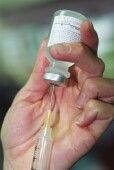Peginterferon Beta-1a Associated with Low Incidence of Treatment-emergent Antibodies in Relapsing-Remitting Multiple Sclerosis
Low rates of immunogenicity observed in study support the potential benefits of subcutaneous peginterferon beta-1a in the treatment of patients with relapsing-remitting multiple sclerosis.

Studies have shown treatment-emergent neutralizing antibodies often develop in patients with relapsing-remitting multiple sclerosis treated with interferon beta, which reduces treatment efficacy.
Seeking to reduce the incidence of this, researchers have been testing pegylated interferon products in this population to see if there are any reductions in immunogenicity without any concomitant loss in efficacy.
At the 2014 Annual Meeting of the Consortium of Multiple Sclerosis Centers (CMSC) and the Sixth Cooperative Meeting with Americas Committee for Treatment and Research in Multiple Sclerosis (ACTRIMS), Scott Newsome, DO, presented data from the first two years of the ADVANCE study, which looked at the immunogenicity of subcutaneous peginterferon beta-1a in patients with relapsing-remitting multiple sclerosis.
Newsome is director of neuroimmunology and neuroinfectious disorders at Johns Hopkins in Baltimore, MD.
During the first year of the study, patients received either placebo or peginterferon beta-1a 125 µg administered every 2 or 4 weeks. At the end of the first year, patients on placebo were re-randomized to receive peginterferon beta-1a 125 µg administered every 2 or 4 weeks. Researchers collected pre-dose serum samples from all patients during year 2 on weeks 60, 72, and 96, which were tested to measure anti-interferon beta-1a antibodies, anti-interferon beta-1a neutralizing antibodies, and pegylation antibodies.
Newsome said that during year 2 of the study, persistent treatment-emergent antibodies “were low” in patients who had switched to peginterferon beta-1a from placebo, as well as in the two groups that had received peginterferon beta-1a for the full 2 years.
He said the incidence of interferon beta-1a antibodies was 1% across all groups and incidence of neutralizing antibodies was < 1%. Incidence of anti-pegylation antibodies was 3%, < 1%, and 2% in the group that switched from placebo, the peginterferon beta-1a 125 µg administered every 2 weeks group, and the peginterferon beta-1a 125 µg administered every 4 weeks group, respectively.
The researchers reported that “no discernable impact on clinical efficacy or safety was observed in this study.”
The low incidence of treatment-emergent antibodies across all groups, coupled with the negligible impact on clinical efficacy, led the authors to conclude that low rates of immunogenicity support the potential benefits of subcutaneous peginterferon beta-1a in the treatment of patients with relapsing-remitting multiple sclerosis.